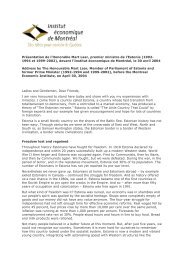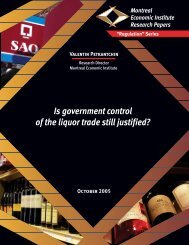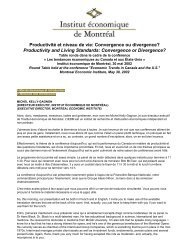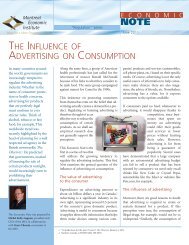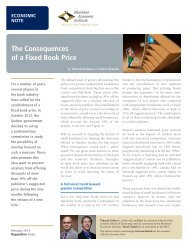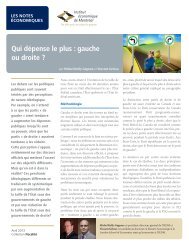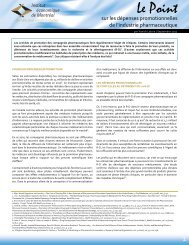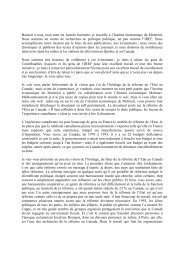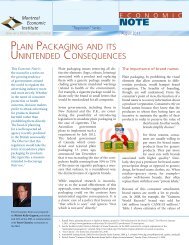Publication (PDF format) - Institut économique de Montréal
Publication (PDF format) - Institut économique de Montréal
Publication (PDF format) - Institut économique de Montréal
Create successful ePaper yourself
Turn your PDF publications into a flip-book with our unique Google optimized e-Paper software.
Why New International Taxes for Development Are Inefficientpoverty and hunger,” or environmental projects—as the German government now does. 33 Regardingthe former proposal, specific global carbon taxeswould be imposed on fuels used in internationalaviation and maritime transport (both goods andpassengers). 34 The purpose of these specific taxeswould be both to help “reduce carbon emissions”and “to generate a sizeable flow of revenues.” 35The proposed tax rate would be US$25 per ton ofCO 2 emissions—several times what an allowancefor a ton of carbon currently costs in the EU. 36Revenues from these taxes would be earmarked forenvironmental protection in <strong>de</strong>veloping countries.A third sort of tax, the “solidarity tobaccocontribution,” was suggested by the High LevelTaskforce on Innovative Financing for HealthSystems in 2009. The starting i<strong>de</strong>a was to “expandthe mandatory solidarity levy on airline tickets an<strong>de</strong>xplore the technical viability of other solidaritylevies on tobacco and currency transactions.” 37The concept of an international tobacco tax, whichwould be levied on top of existing national tobaccotaxes, was <strong>de</strong>veloped by the WHO in a subsequentreport. This micro-levy of perhaps $0.05/packwould be “voluntary” 38 in the sense that memberstates of the WHO could choose whether or not toimpose it on their taxpayers—for whom, of course,it would not be voluntary at all. The tax proceedswould serve to finance health and <strong>de</strong>velopmentprojects. The WHO estimated that it could raise atleast US$5.5 billion in G20+ countries; 39 Bill Gates,who endorses the project of a tobacco tax, evaluatesits potential at US$9 billion. 4033. UN (2009), pp. 71-73; OECD (2010), p. 20.34. IMF (2011), p. 6 and passim.35. UNDP (2012), p. 19.36. About US$4 per ton in the spring of 2013: see “The Collapse of theCarbon Market,” Financial Times, May 23, 2013; and “Worry OverScarcer Credits Propels US Carbon Market RGGI’’, Financial Times,June 9, 2013. See also The Economist (2013a).37. WHO (2011), p. 4.38. Ibid.39. WHO (2011), pp. 12, 21, 34 and passim. The G20+ is ma<strong>de</strong> of thegovernments of Argentina, Australia, Austria, Belgium, Brazil,Bulgaria, Canada, Chile, China, Cyprus, the Czech Republic,Denmark, Estonia, Finland, France, Germany, Greece, Hungary, India,Indonesia, Ireland, Italy, Japan, Latvia, Lithuania, Malta, Mexico, theNetherlands, Norway, Poland, Portugal, Romania, the Republic ofKorea, Russia, Saudi Arabia, Slovakia, Slovenia, South Africa, Spain,Swe<strong>de</strong>n, Turkey, the United Kingdom, and the United States. (WHO2011, p. 24)40. UNDP (2012), p. 20.A fourth category of proposed IFD tax is fora completely disguised tax. The project wouldallocate Special Drawing Rights (SDRs) togovernments of <strong>de</strong>veloping countries, perhaps evenon a regular basis. 41 SDRs are an international assetcreated by the International Monetary Fund (IMF)that can play the role of an international currency. 42Issuance of new SDRs is a hid<strong>de</strong>n tax because itwould generate inflation. Inflation amounts toa tax, as higher prices harm everybody but thefirst recipients of the newly created money; laterrecipients have to pay more for their goods andservices and, thus, are forced to consume less.,,Although IFD revenue-raisingactivities do inclu<strong>de</strong> somevoluntary programs, they relymainly on taxes. ,,Taxes thus occupy a central place in what iscalled IFD. Although IFD revenue-raising activitiesdo inclu<strong>de</strong> some voluntary programs, they relymainly on taxes. One can find other indications ofthe central place of taxes in IFD. Keeping in mindthat illicit flows of capital inclu<strong>de</strong> “commercialtax evasion and avoidance,” the Leading Groupon Solidarity Levies “consi<strong>de</strong>rs the fight against‘illicit financial flows’ as an innovative source of<strong>de</strong>velopment finance,” and inclu<strong>de</strong>s “commercialtax invasion and avoidance” in illicit financialflows. 43 The OECD seems to put transfer pricing inmultinational corporations in the same basket. 44Taxes are the backbone of IFD, which is whythis paper focusses on them.41. Ibid., p. 20.42. IMF (2012).43. UNDP (2012), p. 39.44. OECD (2010), par. 41.Montreal Economic <strong>Institut</strong>e 13



